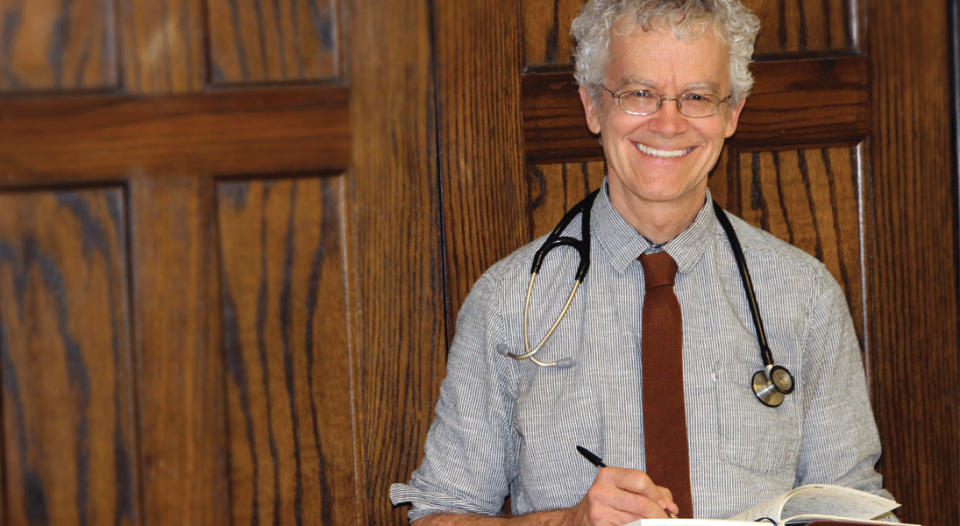Resurrection Lutheran Church, Chicago
Pediatric cardiologist, co-director of Narrative Medicine Group at Advocate Children’s Hospital/Advocate Lutheran General Hospital
I pray for strength and wisdom to provide kind, competent care for the children and families I work with. I pray I can continue to build partnerships and do my work for a long time. I pray people become better stewards of God’s earth, take better care of the environment, listen better to one another and work together to solve the world’s problems.
My favorite part of working with children and their families as a pediatric cardiologist is that I get to tell knock-knock jokes to my patients, and they tell me knock-knock jokes.
To me, church is a place where people of all ages, backgrounds, races and orientations come together, sing together, pray together, love one another and work out their differences.
I first became interested in narrative medicine because writing and journaling helped me understand, process and cope with illness and sometimes death in children with heart disease. Early in my career, I had the mistaken notion that I had to have all the answers and never make a mistake. Journaling about my mistakes and challenges helped me clarify my true job. I am a physician, but I’m certainly not God. Narrative medicine—the practice of telling and receiving stories—helps me listen better to my patients and tell my own story. When we become partners, my patients and I work together to treat problems and build health.
I developed the “Three-Minute Mental Makeover” because I wanted to bring the healing power of writing to my patients and their families. Once I learned how helpful writing was for me, I would suggest writing in a journal to families I encountered who seemed stressed. Most told me they didn’t know what to write. With the 3MMM, which follows a few short writing prompts, my patient writes in a notebook, I write in my journal at the same time, and then we share what we wrote. We published a study showing this guided meditation lowers stress in patients, families and practitioners, and enhances communication for all.
People are surprised to learn I ride my bike year-round from my home near Wrigley Field to work in Park Ridge, Ill.—a 24-mile round trip.
Working at a hospital with a Lutheran heritage is great because there is a strong faith-based tradition in my hospital. I worked with one of the chaplains to start our narrative medicine program in 2013, and the chaplains are a great support for my patients, their parents and the medical staff when challenging situations arise, which happens from time to time.
To me, grace means learning to love and accept myself even when I make mistakes. I want to be a perfect doctor, but I don’t always succeed. I’ve learned it’s OK to say, “I don’t know,” but I never give up on people. I try to do my best to help my patients even in the face of uncertainty. When I make mistakes, I try to admit it to myself, my patients and God.
I like knowing I can join my sisters and brothers in the Lutheran church to support important causes at the local, national and international level.
It’s important to me to be involved in my congregation because I like being part of a large family of faith-oriented people. It’s important to have a wide variety of friends and acquaintances to rely on in good times and bad. I try to support my church family members as much as I’m able, and I also look to them for support when I’m having a tough time. I enjoy coming together each week, singing hymns and songs I like with my friends at church.
I’m a Lutheran because I grew up in a Lutheran church, went to Camp Luther Dell in northern Minnesota and am grateful to be a member of my current church since 1985. I like knowing I can join my sisters and brothers in the Lutheran church to support important causes at the local, national and international level.
I share my faith by sharing with patients and families when we write together in the hospital and clinic.
Being a good steward of our health means setting a good example, practicing what I preach and making a personal connection with my patients. Starting with parents of newborns through to teenagers and adults, I talk about the importance of eating plenty of fruits, vegetables and whole-grain foods, minimizing junk food and exercising a lot.
I wanted to pursue a career in medicine because I love science, people and hearing stories, and I’m interested in building health, preventing disease and working together to treat illness in the best way possible.
I believe patients get the best care when doctors, nurses, therapists and patients listen to one another and work together as partners.
I believe storytelling is related to health because I have experienced the healing power that comes when a patient of mine tells me her story, I take in that story and together we create a plan of action that can work for that particular situation. Some of my patients have been to multiple doctors who didn’t take the time to listen, so the underlying cause wasn’t identified and the problem wasn’t addressed. Listening to stories takes a bit of time, but in my opinion, this is a more efficient way of providing health care for my patients. Many of my patients have told me that writing in the journals we provide has helped them tremendously.
Sentence prompts are provided to each person featured. If you’d like to nominate someone for “I’m a Lutheran,” email Megan Brandsrud.





